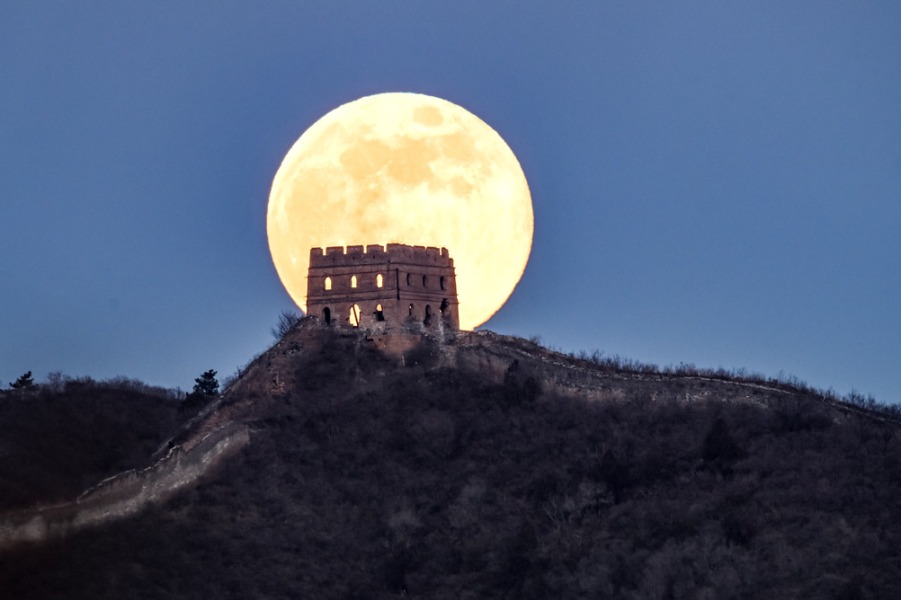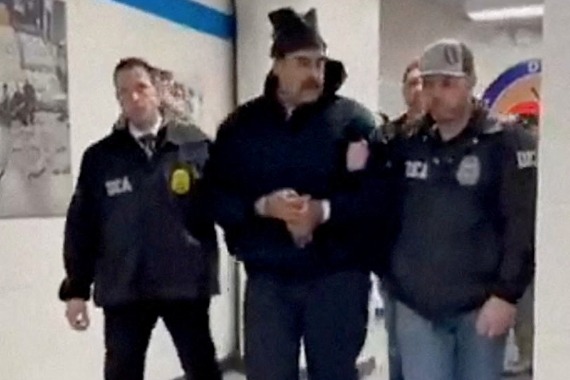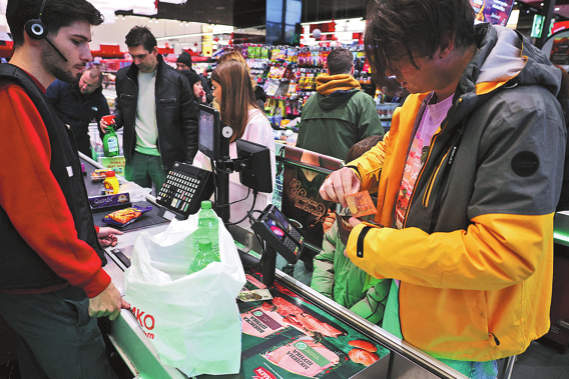ITALY BATTLES TO ENFORCE NATIONWIDE LOCKDOWN
Prime minister praised for decision, but challenges emerge

Editor's note: Nations are collaborating in the fight against the novel coronavirus pneumonia outbreak to limit the damage to people's health and the impact on the global economy. Here, in the second part of a series titled "One World, One Fight", we look at how countries can work together.
Since a nationwide lockdown was imposed in Italy on Monday evening, Franco Giovinazzo, proprietor of the Spazio Caffe in Rome, has had no difficulty ensuring his customers keep a safe distance from one another.
"I wish I was having problems keeping people apart, but that's the least of my worries. The real problem is that there's no one here," he said.
The Italian government has widened its lockdown of cities and regions hit hard by the novel coronavirus pneumonia outbreak to include the entire country. It has been lauded for the decision, but enforcing the new rules has been challenging.
While panic buying has taken place in some areas of the country, streets have remained eerily quiet in others.
The nationwide restrictions imposed on Monday followed a lockdown announced by Prime Minister Giuseppe Conte the previous day for a large area of the nation's industrial north.
Home to some 16 million people and including the cities of Milan and Venice, this area was effectively placed under quarantine, with people told they could not travel to other parts of the country.
However, by Monday evening, Conte said the scale of the initial lockdown was insufficient to contain the virus. As a result, he extended the restrictions to include the entire nation of 60 million people.
"We are facing an emergency, a national emergency," he said in a televised address to announce the new restrictions. "We have to limit the spread of the virus and prevent our hospitals from being overwhelmed."
Conte said people should only venture out of their homes to go to work, to shop, or for emergencies, adding, "there is no more time".
"We're having an important growth in infection... and of deaths," he said. "The whole of Italy will become a protected zone."
Conte said schools, nightclubs, museums, cinemas and gymnasiums nationwide must remain closed.
All religious, cultural and sporting events have been suspended and cruise ships are not allowed to dock at Italian ports. However, public transportation services are continuing to operate.
The restrictions, which have been praised by the World Health Organization and will initially last until April 3, mirror the successful steps China took weeks ago to stem the spread of the virus.
WHO Director-General Tedros Adhanom Ghebreyesus said Italy was making "genuine sacrifices" in the global fight against the virus.
The WHO said in a statement, "Allowing uncontrolled spread should not be a choice of any government, as it will harm not only the citizens of that country but affect other countries as well."
The director-general said that four countries-China, Iran, Italy and South Korea-had 93 percent of the world's confirmed cases of infection from the virus.
"Now that the virus has a foothold in so many countries, the threat of a pandemic has become very real," he added.
In the United Kingdom, Paul Hunter, a professor of medicine at the University of East Anglia, agreed with this assessment and praised Italy for taking such drastic steps.
"The recent extension of COVID-19 controls in Italy represent one of the most rigorous countrywide control measures implemented in the past 50 years," he said.
"Whilst we have seen in Wuhan that such intensive social distancing can bring the epidemic under control, it is far from clear how long this may need to be maintained in the Italian context."
As of Tuesday afternoon, with Italy declaring 10,149 infections and 631 deaths from the outbreak, the mood nationwide was bordering on panic.
'A lot of tension'
Italian media reports said people had been frantically buying food and other essentials at supermarkets since the nationwide lockdown was announced.
Greg Foster, a Briton living in the ancient hilltop city of Matera in the extreme south of Italy, said people understand the need for the restrictions, but many do not like them. "There's a lot of tension. It's all very unnerving."
He said all entertainment venues were closed in the city, along with office buildings.
Notices have been placed at restaurant entrances, telling customers they must wash their hands, keep at least 1 meter apart and avoid any physical contact, he added.
For many people, the introduction of the restrictions triggered the urge to flee "virus hotspots" to other parts of the country, resulting in checkpoints being installed on motorways, at railway stations and at airports.
The Carabinieri, Italy's military police, are enforcing travel restrictions on the country's roads, along with municipal police forces. Railway police and healthcare workers are ensuring that people do not travel on the country's railways without good reason.
Those who flout the travel restrictions face a three-month prison term.
Italian politician Lia Quartapelle said on Today, the BBC's flagship breakfast radio program, that she believed the Italian public was starting to get behind the lockdown.
"We're seeing that people are increasingly understanding that they have to behave differently," she said.
However, business broadcaster CNBC said the travel restrictions and other measures had prompted panic among many Italians. It said thousands of people who viewed a draft version of the new restrictions on Saturday, when it was published by a newspaper, immediately left the virus-hit north of the country in droves.
The possibility of people infected with the virus flooding into the south, where hospitals are not so well equipped as those in the north, prompted Michele Emiliano, president of the southern Puglia region, to take to Facebook.
"I speak to you as if you were my children, my brothers, my nephews and nieces: Stop and go back," he posted. "Do not bring the epidemic that has hit Lombardy, Veneto and Emilia-Romagna to your Puglia."
Jole Santelli, the governor of Calabria, also in the south of the country, told La Repubblica newspaper, "Returning from the north in an uncontrolled way puts our country in danger."
He said the government must prevent such mass movements of people if it is to avoid "a disastrous bomb".
While hospitals in the north are undoubtedly better equipped than their southern counterparts, they are already under immense pressure.
Antonio Pesenti, the intensive care coordinator in Lombardy, which has the largest proportion of infections, wrote on Facebook that the region's healthcare system was "one step from collapse".
"We are now being forced to set up intensive care treatment in corridors. We've emptied entire hospital sections to make space for people who are seriously sick," he said.
Pesenti added that the region's hospital system was grappling with "a tsunami of patients" and predicted that the tidal wave would grow, with as many as 18,000 people seeking a hospital bed by the end of this month.
"If people would just stay home, we could end this in two weeks," he added, reinforcing the thinking behind the decision taken by Conte, the prime minister, to lock down the entire nation.
Massimo Galli, director of infectious diseases at the Luigi Sacco Hospital in Milan, said there are insufficient beds to cope with demand.
"I am very concerned," he told Reuters. "The pressure on hospitals in Lombardy is enormous. I am very, very worried about the impact the virus will have on our health system."
Chinese support
Giorgio Gori, the mayor of Bergamo, a city in Lombardy, told RAI state television that people needed to finally grasp the seriousness of the situation.
"Until a few days ago, the thinking was that the alarm would pass in some weeks, and we just need to follow the rules," he said. "Now, we need to explain to citizens that the situation is very, very serious and our hospitals are on the point of collapse."
To show their support for Italians and help ease the strain, Chinese living in Naples handed out 6,000 free face masks and donated protective clothing and gloves to hospitals and outbreak management offices. Local media reported the group handing out masks on one street included anti-racism advocates and members of a Chinese community association.
However, while many people are observing the new restrictions, others are not, with resentment surfacing on the day they were introduced.
Rioting broke out at 27 prisons after inmates heard that family members and friends were being banned from visiting them as part of the attempt to contain the virus.
Sixty inmates at a prison in Modena rioted in an incident that left seven people dead. The prisoners reportedly started a fire and many of them took drugs looted from the facility's infirmary, the Corriere de Bologna newspaper reported.
The Italian Justice Ministry said: "The protests concerned the coronavirus emergency, as well as the measures issued by the government to reduce the risk of infection and protect those who live and work within the prison."
The authorities quelled the riots and re-established order, but the government acknowledged that its lockdowns, closures and travel restrictions equated to "massive shock therapy".
In addition to personal inconvenience, it said there would be a huge impact on the nation's economy.
Conte said the government would plow capital into the economy in an attempt to mitigate the damage caused to industry and to tourism.
The UK is among nations advising against travel to Italy, except in any emergency. The Foreign Office said in a statement, "The safety of British nationals is always our number one priority."
Similar steps have been taken by other countries, including Austria and Switzerland.
British Airways has suspended flights to Italy until April 3, and other carriers have also stopped flying to the country. People arriving in the UK from Italy are being told to self-isolate for 14 days.
Italian tourism representatives know the virus will have an unprecedented impact on the vibrant holiday industry, acknowledging late last month that 200 million euros ($226 million) of bookings have been canceled as a result of the outbreak.
Market uncertainty saw Italian stocks fall significantly this week, the Italian news agency ANSA reported.
Economists have little doubt that the Italian economy, which has been weak for years, will go into full recession as a result of the outbreak.
The nation's Finance and Economy Ministry said in a statement this week that core sectors of the economy and government offices will remain open for business regardless of the state of the outbreak. However, it warned that the nationwide lockdown would impact sectors including transportation, accommodations, food, drink and entertainment.
"A temporary downturn in some sectors or areas of the country is preferable to a longer crisis that could spread to the whole economy," the ministry said in a statement.
On Tuesday, it said it would raise its stimulus package of 7.5 billion euros to 10 billion euros, in a bid to mitigate the damage.
Meanwhile, Sky News reported doctors' concerns over the strain of the virus spreading in Italy, where about 6 percent of confirmed infections have resulted in death, compared with a global fatality rate of between 1 percent and 3 percent.
The broadcaster said this could be due to Italy testing more people than other nations and therefore uncovering more infections, or it might be an indication that infection has been established in the country far longer than previously thought.
Giovanni Rezza, who leads the Infectious Diseases Department at Italy's National Institutes of Health, said the high mortality rate could also be due to the country having a much older-than-average population.
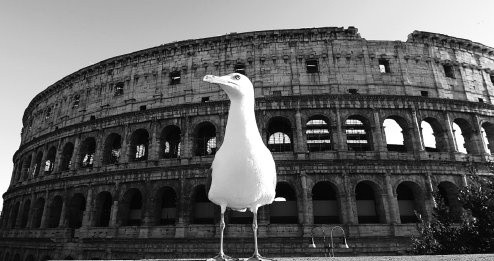
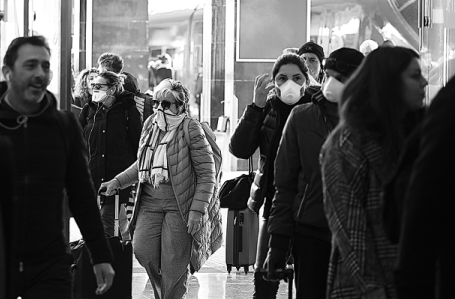
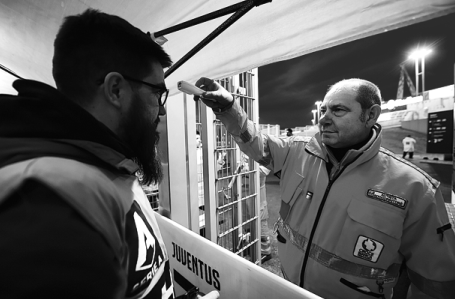
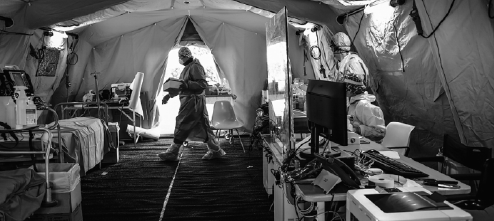
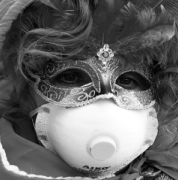
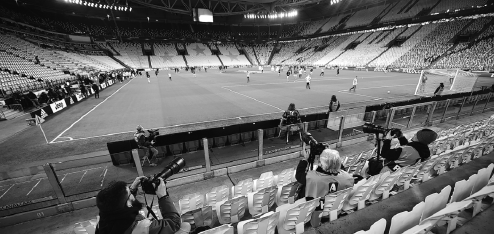
Today's Top News
- Xi extends condolences over fire disaster in Switzerland
- US actions signal a return to imperialism, colonialism
- China calls on US to release Maduro and his wife at once
- ROK president arrives in Beijing for state visit
- US military action in Venezuela tramples over international law
- China's railway network sets new records in 2025


















